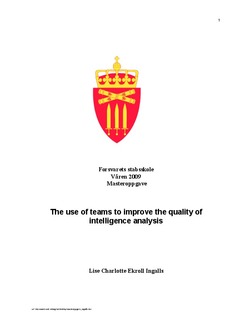The use of teams to improve the quality of intelligence analysis
Master thesis
Permanent lenke
http://hdl.handle.net/11250/99872Utgivelsesdato
2009Metadata
Vis full innførselSamlinger
- Masteroppgaver [450]
Sammendrag
This work sets out to explore a new contribution to alleviate the distortive impact that inherent intellectual shortcomings may have on intelligence analysis. This is highly relevant in efforts to improve intelligence, as failures in analysis are closely linked to intelligence failures. Previous work to address this issue has covered a wide range of approaches, to include the development of the use of alternative competing hypotheses. Business management has established that that the use of teams is suitable to improve performance at critical delivery points, but a more in depth discussion on the team factor in intelligence analysis seems not to have been carried out. Thus an exploration of this factor is well worth trying. The work used both a theoretical and an empirical perspective in exploring the relevance of the use of teams in analysis. The aim of the work was see if adequate substantiation could be made in order to claim that the use of teams in intelligence analysis could improve the quality of analysis, i.e. enabling the production of predictions which are more accurate than they would be without the use of teams. The theoretical perspective drew on literature from both management and intelligence. The primary data was collected by conducting individual interviews with personnel from the tactical level of an intelligence organisation in the Norwegian Armed Forces who were either all-source intelligence analysts or were working in positions closely associated with such analysis in the same intelligence unit. Following analysis it was determined that the use of teams in intelligence analysis could improve the quality of analysis, and herein lies the main contribution of this work. As this conclusion is primarily valid for intelligence analysis at the tactical level, further study on the use of teams at the strategic level of intelligence is recommended.
